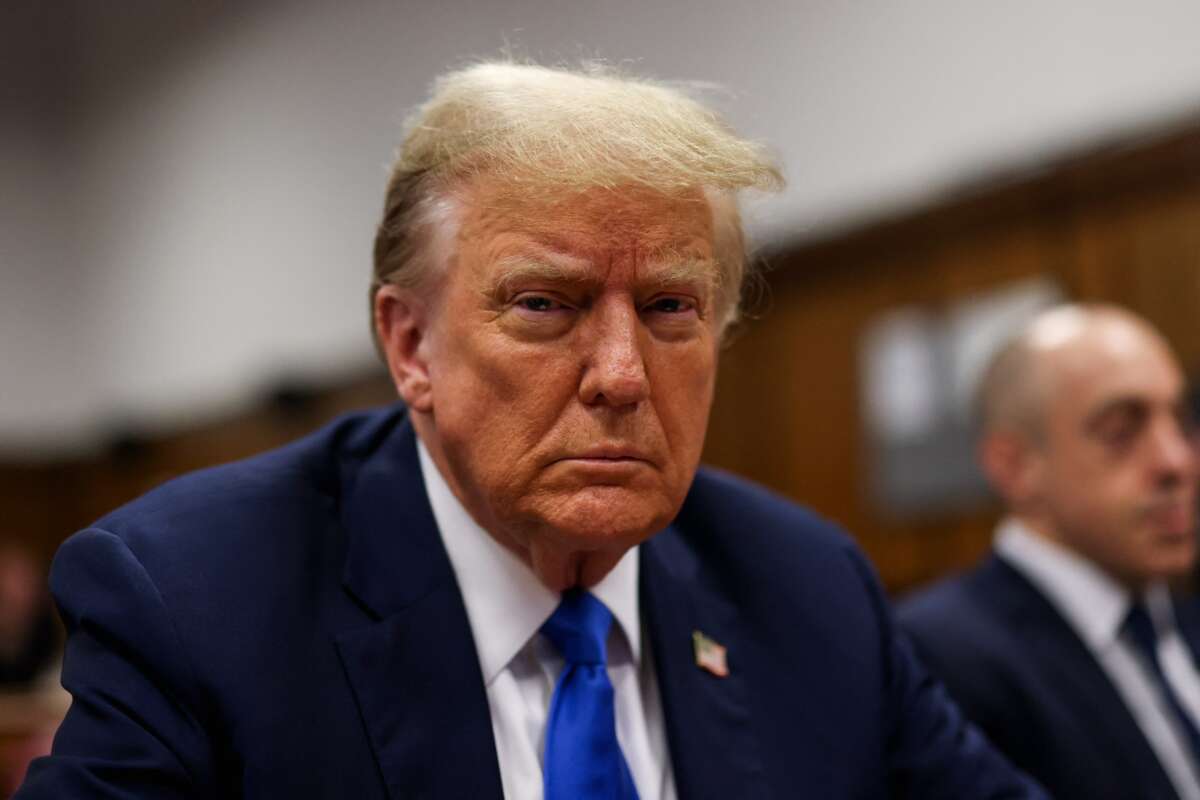Support justice-driven, accurate and transparent news — make a quick donation to Truthout today!
Opening statements are set to begin today for Donald Trump’s New York-based criminal trial, which focuses on his efforts to hide “hush money” payments to women with whom he allegedly had extramarital affairs ahead of the 2016 presidential election.
Such payments are not themselves inherently illegal, but the methods Trump used to ensure they’d never go public could be deemed as such by a jury of his peers. Trump, for example, reportedly paid adult film actor Stormy Daniels $130,000 to keep quiet about their affair, ordering his then-“fixer” lawyer Michael Cohen to make the payments himself. Cohen then was reimbursed through payments made by the Trump Organization, which labeled them as being for legal services he provided.
In New York, it is against the law to disguise payments like these by misrepresenting business expenses. Additionally, Trump’s attempt to hide these payments could be considered an illegal concealing of campaign expenditures, as they were made to enhance his chances of winning the election.
On Friday, the final set of jurors, including alternates, were selected for the trial. For many observers, the selection of jurors went faster than anticipated, although not impossibly fast, as some had predicted it would take between one to two weeks to complete.
For Trump, the selection of jurors was too quick.
Trump spent much of the week complaining that his lawyers weren’t allowed “unlimited” strikes to block potential jurors they didn’t like from being able to serve, despite state law clearly setting the standard at 10 strikes for both prosecutors and the defense. Trump also claimed, without real evidence, that Judge Juan Merchan was “rushing” the trial to do “everything he can for the Democrats.”
Despite the right to a speedy trial being a celebrated constitutional right, Trump’s legal team has tried (and failed) numerous times to delay the start of the trial. Those efforts continued even on Friday, after the jurors were picked, with a filing to an appellate court echoing Trump’s claims of a rushed jury selection process. Minutes after that request was filed, it was denied by appellate court Justice Marsha Michael.
Merchan himself addressed the continued attempts to delay the trial, belittling Trump’s lawyers for their strategy of trying to delay it rather than accepting that it is indeed going to move forward this week.
“At some point, you need to accept the court’s rulings,” Merchan said. “There’s nothing else to clarify. There’s nothing else to reargue. We’re going to have opening statements on Monday morning. This trial is starting.”
Trump’s attempts to delay the trial may not be justified, but the strategy is understandable, as polling suggests the more the American people hear about it, the less they like what they’re hearing about him.
Despite it being on news reports daily, an Economist/YouGov poll published last week found that a majority of respondents from across the country haven’t been paying much attention to the trial, with 43 percent saying they’ve only heard “a little” about it and nearly one in five (18 percent) saying they haven’t heard anything at all. Just 39 percent said they’ve heard “a lot” about the trial so far.
Voters intending to back Trump in the 2024 election for president tended to have higher rates of ignorance surrounding the trial, while those intending to vote for Biden had higher levels of knowledge about it.
A majority in the poll, 52 percent, said the charges against Trump are serious or at least somewhat serious. In a separate question on his possible guilt in the case, a plurality, 43 percent, said Trump should be convicted, versus 37 percent who said he shouldn’t be and 20 percent who said they weren’t sure.
Trump is the first ex-president in U.S. history to face a criminal trial following his departure from office. He faces three other indictments in other jurisdictions — one other state-based case in Georgia, regarding his attempts to overturn the results of the 2020 election in that state, and two federal cases, one involving his improper retention of classified documents and the other, too, regarding his attempts to usurp his election loss to Biden through illegally manipulating the Electoral College and other actions.
A conviction in the New York hush money trial or any of the other three Trump is facing would be detrimental to his prospects of winning the White House. An NPR/PBS NewsHour/Marist poll in February showed that Trump and Biden are in a statistical tie when it comes to whom voters prefer. Yet, if Trump is convicted in any of the four cases he’s facing, Biden takes the lead, defeating Trump nationally by 6 points.
A terrifying moment. We appeal for your support.
In the last weeks, we have witnessed an authoritarian assault on communities in Minnesota and across the nation.
The need for truthful, grassroots reporting is urgent at this cataclysmic historical moment. Yet, Trump-aligned billionaires and other allies have taken over many legacy media outlets — the culmination of a decades-long campaign to place control of the narrative into the hands of the political right.
We refuse to let Trump’s blatant propaganda machine go unchecked. Untethered to corporate ownership or advertisers, Truthout remains fearless in our reporting and our determination to use journalism as a tool for justice.
But we need your help just to fund our basic expenses. Over 80 percent of Truthout’s funding comes from small individual donations from our community of readers, and over a third of our total budget is supported by recurring monthly donors.
Truthout has launched a fundraiser to add 432 new monthly donors in the next 7 days. Whether you can make a small monthly donation or a larger one-time gift, Truthout only works with your support.
